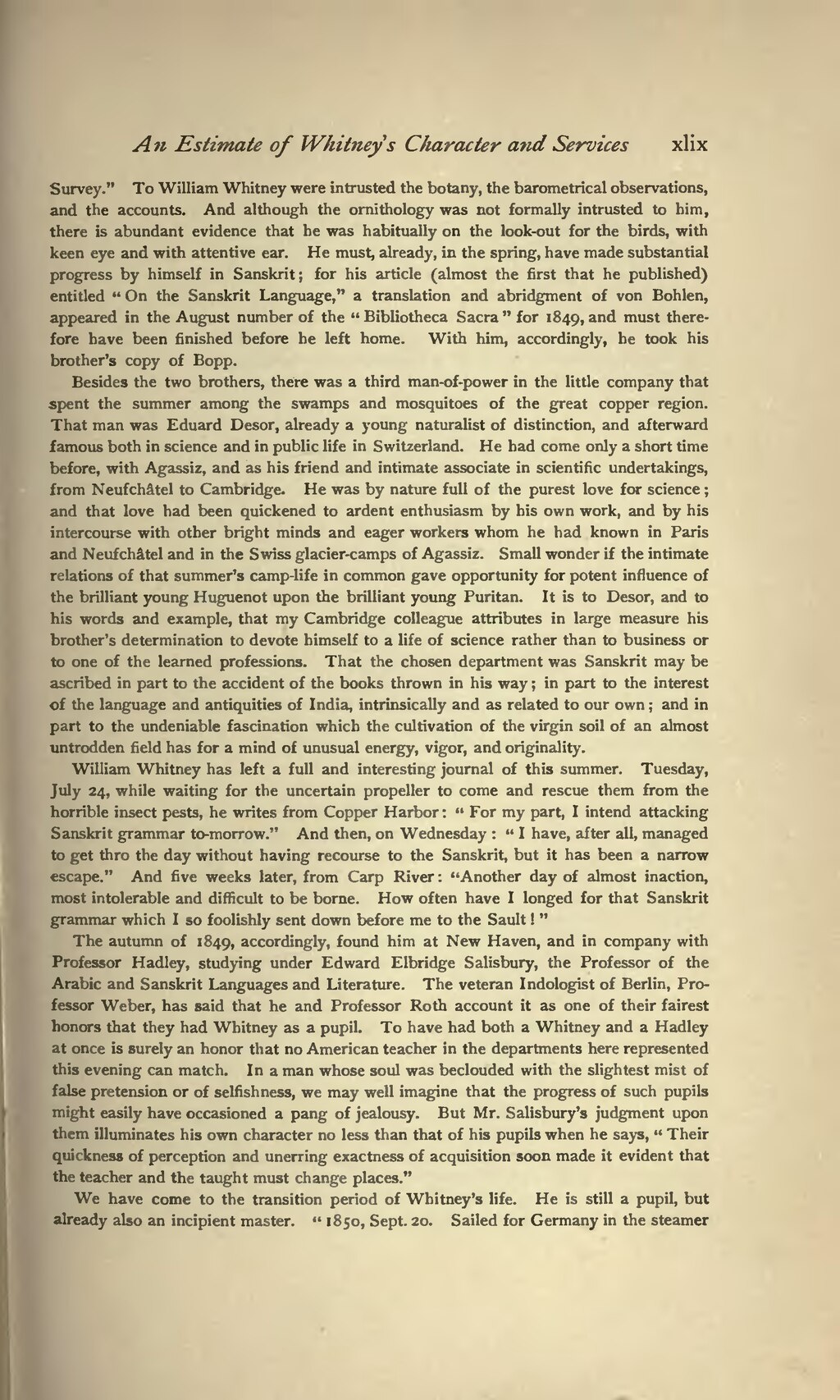Survey." To William Whitney were intrusted the botany, the barometrical observations, and the accounts. And although the ornithology was not formally intrusted to him, there is abundant evidence that he was habitually on the look-out for the birds, with keen eye and with attentive ear. He must, already, in the spring, have made substantial progress by himself in Sanskrit; for his article (almost the first that he published) entitled "On the Sanskrit Language," a translation and abridgment of von Bohlen, appeared in the August number of the "Bibliotheca Sacra" for 1849, and must therefore have been finished before he left home. With him, accordingly, he took his brother's copy of Bopp.
Besides the two brothers, there was a third man-of-power in the little company that spent the summer among the swamps and mosquitoes of the great copper region. That man was Eduard Desor, already a young naturalist of distinction, and afterward famous both in science and in public life in Switzerland. He had come only a short time before, with Agassiz, and as his friend and intimate associate in scientific undertakings, from Neufchâtel to Cambridge. He was by nature full of the purest love for science; and that love had been quickened to ardent enthusiasm by his own work, and by his intercourse with other bright minds and eager workers whom he had known in Paris and Neufchâtel and in the Swiss glacier-camps of Agassiz. Small wonder if the intimate relations of that summer's camp-life in common gave opportunity for potent influence of the brilliant young Huguenot upon the brilliant young Puritan. It is to Desor, and to his words and example, that my Cambridge colleague attributes in large measure his brother's determination to devote himself to a life of science rather than to business or to one of the learned professions. That the chosen department was Sanskrit may be ascribed in part to the accident of the books thrown in his way; in part to the interest of the language and antiquities of India, intrinsically and as related to our own; and in part to the undeniable fascination which the cultivation of the virgin soil of an almost untrodden field has for a mind of unusual energy, vigor, and originality.
William Whitney has left a full and interesting journal of this summer. Tuesday, July 24, while waiting for the uncertain propeller to come and rescue them from the horrible insect pests, he writes from Copper Harbor: "For my part, I intend attacking Sanskrit grammar to-morrow." And then, on Wednesday: "I have, after all, managed to get thro the day without having recourse to the Sanskrit, but it has been a narrow escape." And five weeks later, from Carp River: "Another day of almost inaction, most intolerable and difficult to be borne. How often have I longed for that Sanskrit grammar which I so foolishly sent down before me to the Sault!"
The autumn of 1849, accordingly, found him at New Haven, and in company with Professor Hadley, studying under Edward Elbridge Salisbury, the Professor of the Arabic and Sanskrit Languages and Literature. The veteran Indologist of Berlin, Professor Weber, has said that he and Professor Roth account it as one of their fairest honors that they had Whitney as a pupil. To have had both a Whitney and a Hadley at once is surely an honor that no American teacher in the departments here represented this evening can match. In a man whose soul was beclouded with the slightest mist of false pretension or of selfishness, we may well imagine that the progress of such pupils might easily have occasioned a pang of jealousy. But Mr. Salisbury's judgment upon them illuminates his own character no less than that of his pupils when he says, "Their quickness of perception and unerring exactness of acquisition soon made it evident that the teacher and the taught must change places."
We have come to the transition period of Whitney's life. He is still a pupil, but already also an incipient master. "1850, Sept. 20. Sailed for Germany in the steamer
